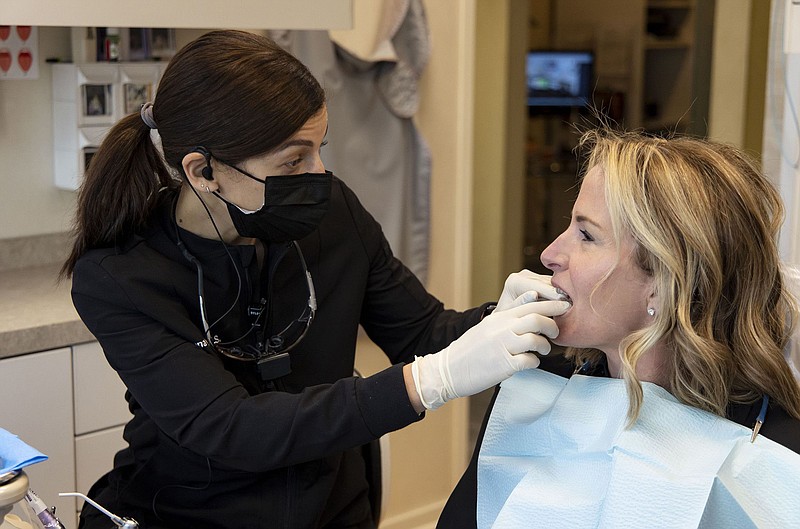CHICAGO -- Along with everything else, COVID-19 is also creating problems with our teeth.
That's what dentists say after treating patients who are under stress during the pandemic and taking it out on their teeth. According to local providers and the American Dental Association, dentists have seen more stress-related oral health conditions during the pandemic.
"People are clenching more, grinding more, cracking more teeth," said Dr. Rana Stino, dentist and partner at Water Tower Dental Care in Chicago. "Even their bite guards are fracturing."
The ADA's Health Policy Institute conducted a poll in October that found dentists reported an increase in stress-related conditions, such as jaw grinding or clenching, chipped teeth, cracked teeth and joint dysfunction.
According to the poll, 69 percent of dentists saw an increase in patients grinding and clenching their teeth, and 63 percent said they saw more patients with chipped teeth and cracked teeth, all conditions often associated with stress.
Stino has seen more of all of these issues, and that creates conversations with patients about how they might be experiencing stress. Some aren't even aware they are grinding their teeth if it's happening at night. Especially at the beginning of the pandemic, when a dentist's office might be one of the few places patients actually went, they disclosed stress about losing jobs or juggling children at home.
"You can see some really prominent wear patterns on their teeth, you can see some cheek biting marks, those are textbook signs," Stino said.
She'll also refer patients to physical therapists for pain in their necks, shoulders and backs. Patients may also complain of headaches or ringing in their ears. All of these symptoms can be rooted in clenching and grinding that, left untreated, creates jaw pain.
In nearly 13 years of practice, Chicago dentist Dr. Karen Fields, whose practice is 28 to BRUSH in Forest Park, has seen an unprecedented level of stress-related dental issues.
"I can honestly say I have seen the greatest number of cracked teeth that I have seen in my practicing career over these past two years," she said.
Many patients are coming in with broken teeth; she's also hearing more about headaches and neck pain.
"The pandemic has created a heightened level of stress, which has led to a psychosocial habit of grinding and clenching teeth," she said. "With increased stressors, we tend to take them out on our teeth."
Dr. Joel Berg is former president of the American Academy of Pediatric Dentistry and chief dental officer at Willo, a company that makes a toothbrush for children. He said more cracked teeth could be attributed to reasons such as people not attending routine care appointments or stress.
"Certainly the stress levels of all have been elevated during the pandemic," he said.
Dentists say patients should maintain their routine appointments; and parents should ensure their children keep brushing, as well. If you notice fractured or chipped teeth, or neck pain and headaches, tell your dentist, they said.
Dentists also emphasize offices have worked hard to ensure a safe and clean environment.
Reducing stress can help. Anything from relaxing muscles to meditating before bedtime is a good idea. Dentists can get patients a retainer or mouthguard; Botox also is an option for releasing jaw pain.
Stino herself has experienced more clenching, especially when her three children, ages 14, 11 and 6, were remote schooling at home and the dental office was closed for months. She wears a retainer at night and has used Botox.
"I can definitely empathize with my patients," she said.
She reminds patients not to put off basic care appointments, as many health issues can be flagged first in the mouth. Crowns can protect the teeth; but deeply cracked teeth might need to come out.
"Prevention is key," she said. "The longer they linger, they become more challenging to treat."
One good change in the pandemic, Fields added, is patients are more aware of their breath after breathing with a mask right on their face and focusing on exhaled breath.
"Since we have been keeping our noses and mouths covered for nearly two years, many patients have had the opportunity to focus on their breath and notice when it is less than pleasant," Fields said.
Bad breath can be an early detector of things such as diet changes -- a diet low in fruits and veggies can create bad breath, she said -- or an unmanaged health problem such as diabetes. She reminds patients to brush their tongue and the roof of their mouth.

